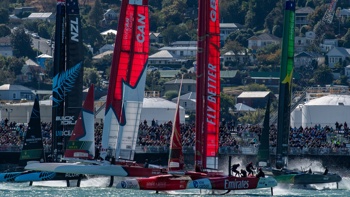Deputy Prime Minister Winston Peters used his speech at the Anzac Day dawn service in Gallipoli to encourage people to “always seek the path of peace” as he warns of growing division.
The Anzac Day dawn service at Gallipoli began at 2.30pm (NZ time) with a Māori karanga opening the commemoration.
An Australian sailor then played a didgeridoo, as crowds sat in darkness. The service was hosted by Mitchell Alexander, public affairs manager for the New Zealand Defence Force (NZDF).
Alexander acknowledged the dignitaries gathered and lives lost in past wars before the Catafalque party, four armed guards who faced outward around a symbolic point, marched forward and took position.
A prayer was read and then Australia’s Deputy Prime Minister Richard Marles spoke on behalf of his nation.
“The spirit of Anzac is selfless. It is about the other. It is about being there for one another. It’s about the precious and unbreakable bonds we all share,” Marles said.
Peters spoke after a performance of Ave Maria by the New Zealand Defence Force and Royal Australian Navy Band.
Peters began his speech in te reo Māori, before saying: “From the distant Pacific Ocean, we arrive with humility upon your land. Our footprints and your footprints are joined forever. The fallen warriors of our people and your people rest together within your ancestral soil. Rest in peace.
“We meet at dawn at the site of a great battlefield. We meet here to commemorate the ground around us as the final resting place of far too many of our young men,” he said.
‘We live in a troubled world, the worst in memory’ - Peters
Peters continued: “From a long-ago battlefield to this morning’s promise, we must leave this ground dedicated to making our worlds better. Then the men buried here will not have died in vain.
“Yet we live in a troubled world, the worst in memory.
“We have emerged from a global pandemic a more divided world. Regional instabilities and the chaos they create threaten the security of too many.”
He said diplomacy had never been needed more than now. “That is our lesson and resolve when leaving Gallipoli today”.
Officials representatives then laid wreaths as bagpipes skirled beneath the twilight sky.
The Ode of Remembrance was then recited in te reo Māori on behalf of the NZDF by Warrant Officer Lance Graham and in English on behalf of Australia’s Defence Force by Warrant Officer Damien Woolfe.
The Last Post was then performed, followed by a minute of silence and then Reveille, at which point flags of Australia and New Zealand were raised from half-mast to full-mast. The national anthems of the three nations then followed.
The dawn service ended when the Catafalque party dismounted from position just before 3.30pm (NZST).
The NZDF said it was in a “good position to fully carry out [its] ceremonial roles” in the Gallipoli Anzac Day dawn service this afternoon.
Co-operation and camaraderie have enabled the defence force to take part after it earlier said it would have to play a reduced role in the ceremony after soldiers’ uniforms and musical instruments were lost in transit.
The NZDF’s Gallipoli lead, John McLeod, said members of the Gallipoli contingent who were not performing ceremonial roles had lent their uniforms to other soldiers who were.
The Australian Defence Force had also lent a bugle to the New Zealand contingent so the Last Post could still be played.
”All our team, including those without uniforms will participate in the Chunuk Bair service,” McLeod said.
”They, like us all, want to be part of a special occasion which remembers those who served at Gallipoli. The vicinity of the commemoration is where more than a thousand New Zealanders died between 8 and 10 August 1915,” he said.
”It has been a case of coming up with solutions to each problem and the contingent have done this really well collectively. Morale is high and we have a very positive attitude towards making the commemorations a fitting tribute to those who have walked this ground before us.”
New Zealand’s National Anzac service cancelled
The country’s National Anzac Day Commemoration Service in Wellington was cancelled earlier today due to strong winds buffeting the capital.
The Ministry for Culture and Heritage said the “unfortunate” decision to cancel the 11am event at Pukeahu National War Memorial Park had been made for the health and safety of veterans, visitors and guests.
Auckland native Lois Stephens prolonged her trip in Wellington to attend the ceremony and said it was a shame it was cancelled. “They’re probably putting public safety first.”
She and her 13-year-old son Jack still made the effort to visit the site to pay tribute to Jack’s great grandfather who fought for the British Army in the second World War. He donned his medals with pride today.

Strong winds have cancelled the National Anzac Day service in Wellington.

Lois Stephens said it was a shame the Wellington service had been cancelled.
A small, reduced service was moved indoors to escape the wind, with veterans and officials invited into the Hall of Memories.
Officials laid wreathes in front of the focal point of the hall - a bronze statue of a mother with her children designed to convey the suffering and burden carried by families during and after times of war.
Governor-General Dame Cindy Kiro delivered her Anzac address to about 100 people at the reduced but intimate service.
With the passage of time, the focus of our remembrance has broadened to recognise the service and sacrifice of all those who have served New Zealand in armed conflict and global peacekeeping efforts, Kiro said.

A small, private service has been moved indoors to escape Wellington's wind.
She said New Zealand had been involved in more than 40 peace keeping operations in more than 25 countries over the past seven decades.
”This Anzac Day, as we reflect on our service personnel’s reputation for courage and steadfastness - a legacy forged at Gallipoli - let us also take pride in New Zealand’s continued willingness to do what is necessary for international peace and security.
”In doing so, we can collectively honour the legacy of our ANZACs and our nation’s shared ongoing and commitment to peace.”
At the end of the service the Last Post sounded before a minute’s silence was held and those gathered sang Australia and New Zealand’s national anthems.
The Atatürk Memorial Wreath-laying Service in Strathmore this afternoon has also been cancelled because of the wind.
Anzac Day attracts anti-war protests
The cancellation of today’s services didn’t however stop anti-war protesters from attending with banners referencing the ongoing conflict in Gaza.

Protesters gather at Wellington's Pukeahu National War Memorial.
Wellington’s iconic Bucket Fountain has also been targeted by protesters, with the water dyed red and posters stuck to its frame.
“Judaism is peace, Zionism is violence”, “No glory in war, No pride in genocide” and “Don’t glorify war” are some of the messages displayed on the posters.

Wellington's Bucket Fountain has been targeted by anti-war protesters on Anzac Day.
Thousands attend dawn services
Thousands woke early this morning to attend dawn services across the country.
The day of remembrance falls on the anniversary of the landing on the now Turkish peninsula of Gallipoli by New Zealand and Australian troops in 1915, part of an ultimately unsuccessful military campaign for the Allies which cost 130,000 lives over 10 months, among them 2779 Kiwis.
Thousands are gathering at dawn ceremonies around the country this morning. Photo / Paul Taylor
In our largest city, the Anzac Day Dawn Service began at 6am at the Auckland War Memorial Museum in the Auckland Domain, while Vector lights on the Auckland Harbour Bridge were lit in poppy-red.
Free remembrance tours would be open to the public until 5pm, and those looking to the sky today might spot the New Zealand Warbirds Association doing a flyover with their trademark billowing smoke.
The dawn parade for the Hastings Anzac Day service. Photo / Paul Taylor
Settled weather is expected across the city today, where dozens of Anzac Day events are planned, with cloud expected to clear to sunshine by this afternoon, and temperatures ranging from a low of 14C to a high of 20C.
Similar conditions are expected across the North Island, but MetService said rain would dominate further south in Queenstown and Invercargill.

Sir Bob Gillies, the last surviving member of the 28th Maori Battalion. Photo / Andrew Warner
Conditions were changeable in other main centres, with Wellington tipped for a high of 17C. Christchurch should see a mainly fine day with a high of 22C and Dunedin should start with some cloud and a high of 18C.
Anzac Day Dawn Service at Hamilton's Memorial Park.
Around the middle of the country; in Wellington, Kāpiti Coast, Marlborough, and exposed parts of inland Otago, Southland and the Canterbury High Country, gales were forecast with several wind watches and warnings in place.
What’s open, what’s not and when you have to pay a surcharge
By Kymberlee Gomes of RNZ
On Anzac Day, most shops need to stay shut until 1pm.
There are just 3½ days a year on which the Shop Trading Hours Act 1990 prevents most shopping: Good Friday, Easter Sunday, Christmas Day and the first half of Anzac Day.
What’s open?
Exemptions apply to a few places, which are allowed to open:
- certain kinds of shops (limited to small grocery shops, pharmacies, service stations, takeaways, bars, cafes, duty-free stores, shops providing services (and not selling things), real estate agencies, public transport terminals, souvenir shops and exhibitions “devoted entirely or primarily to agriculture, art, industry and science”.
- select places such as the Carnegie Centre in Dunedin or Mariners Mall in Picton, among others, if a cruise ship is in port (full list here). Shops covered by area exemptions cannot change them and no new exemptions can be granted.
Shops without exemptions must stay closed during the first half of April 25.
Mondayisation does not affect shop trading restrictions because they apply only to the calendar date of Anzac Day.
Retailers can be fined up to $1000 if they open illegally.
Some bars, cafes and restaurants can sell alcohol, as long as it is accompanied by a meal.
Surcharges
Cafes and restaurants can choose to add a surcharge for opening on the morning of Anzac Day.
The surcharge covered the additional cost of wages on a public holiday, Restaurant Association chief executive Marisa Bidois said.
“Typically, surcharges range from 10-15 per cent.
“Some businesses incorporate the extra costs of operating on public holidays into their annual operating expenses. This approach allows them to spread the recovery of these costs over the course of the year, rather than imposing a surcharge specifically on public holidays,” Bidois said.
Whether cafes opened on Anzac Day morning would depend on their location and customer habits.
“To avoid surprises, diners should confirm whether a surcharge applies either ahead of time or upon arrival. Most establishments will inform customers of any additional fees through visible signage.”
The Commerce Commission has also said establishments must make it well-known to customers that a surcharge will be payable before they decide to buy or engage the service.
“It must be clearly disclosed, for example, by adding information to their website for online sales or placing a sign outside,” the commission says on its website.
“In addition, the reason for any surcharge must be accurately described and must not be capable of misleading consumers. The surcharge should not exceed those costs, and the costs should actually be incurred by the business.”
This story was originally published on the Herald, here
Take your Radio, Podcasts and Music with you









